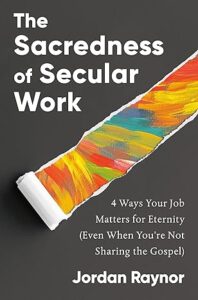As Christians, we often view our day jobs as necessary evils – just a means to support the “real” spiritual work. But according to Jordan Raynor, this perspective is not only deeply unfulfilling, it’s unbiblical. In his latest book “The Sacredness of Secular Work,” Raynor makes a compelling case that all our work, both inside and outside the church, has inherent value and eternal significance.
On this week’s StrongTeams.com podcast Raynor argues that the gospel preached in most churches today is an “abridged” version focused solely on personal salvation. While Christ absolutely came to save us from our sins, that was only part of his redemptive work. The full gospel story is that Jesus came to redeem and restore all of creation. As Colossians 1 states, God is reconciling all things to himself through Christ – both on earth and in heaven.
Our Work Has Eternal Value
This has profound implications for how we view our daily jobs. If God’s plan is to renew the material world rather than whisk our souls away to a heavenly afterlife, then our everyday work has eternal value. When we are creating businesses, serving customers, making art and developing products, we are partnering with God to build his kingdom. We’re not just biding time in meaningless toil until heaven – our work actively matters.
In the early church, most evangelism was done not by clergy but by everyday Christians through their vocations. It was by doing excellent work and serving their communities that the message of Christ spread. The power of the gospel was intertwined with Christians doing compelling work for the common good.
Overemphasis on the Great Commission is Hampering our Witness
One of the most fascinating parts of Raynor’s interview is when he suggests that overemphasizing the Great Commission as the only priority unintentionally hampers our evangelistic efforts. When Christians believe proclaiming the gospel is the only work that matters, they feel guilty investing in the very spheres that provide the most opportunities to reach people – their workplaces and industries. This causes them to be disengaged and half-hearted in their jobs rather than excelling.
Additionally, putting foreign missions and paid ministry on a pedestal implicitly tells young people that their talents and passions can’t be used for God’s purposes. Is it any wonder so many leave the faith when their deepest drives aren’t validated? The culture affirms their creativity while the church doesn’t. Integrating faith and work isn’t just about personal fulfillment – it’s essential apologetics.
The First Commission: Fill the Earth and Steward It
To be clear, the Great Commission is non-negotiable for Christians. But it doesn’t negate Genesis’ original “First Commission” to steward creation, which still applies today. Using our gifts to create value and serve others through our work is part of God’s design.
And this applies to all work, not just “important” jobs. Whenever we use our talents to make the world more useful, true, good or beautiful, we reflect God’s nature. Our work itself testifies powerfully to his character.
Vocation Theology Essential to the Mission of the Church
Seeing our work as partnering with God energizes both worship and witness. As Raynor says, “fully alive people attract the lost like pollen attracts bees.” Integrating faith and vocation isn’t a distraction from ministry – it’s one of the main ways we love God and neighbor.
The church desperately needs to recover a robust theology of vocation. When we see our daily jobs as part of God’s plan rather than distractions, it energizes our calling. Raynor provides practical guidance for aligning careers with God’s purposes, like crafting a personal mission statement and developing an “anti-bucket list” – things you’ll choose not to do.
It’s time to embrace the First Commission alongside the Great Commission. Whatever you do, do it wholeheartedly as working for God. Your job isn’t a distraction – it’s a central way you honor him. So let’s get to work!
Here are 5 questions to help your team explore how they measure up against the concepts from this summary:
- Do we view our day-to-day work as having inherent value and participating in God’s kingdom purposes? Or do we see it just as a paycheck to fund “real” ministry?
- Does our church’s gospel message recognize Christ’s full redemptive work – renewing all of creation? Or do we present an “abridged” gospel focused solely on individual salvation?
- Do we affirm and equip our people to see their vocations as avenues for disciple-making and living on mission? Or is ministry only what happens within the church walls?
- Are we helping people integrate their faith and gifts across every area of life – family, work, community, hobbies, etc.? Or are we implicitly communicating that some callings matter more than others?
- Are we developing a culture where people are energized in their faith and work? Where the excellent use of their talents create opportunities for spiritual conversations? Or is there a sense of guilt and compartmentalization between the sacred and the secular?
Listen to the full interview:

